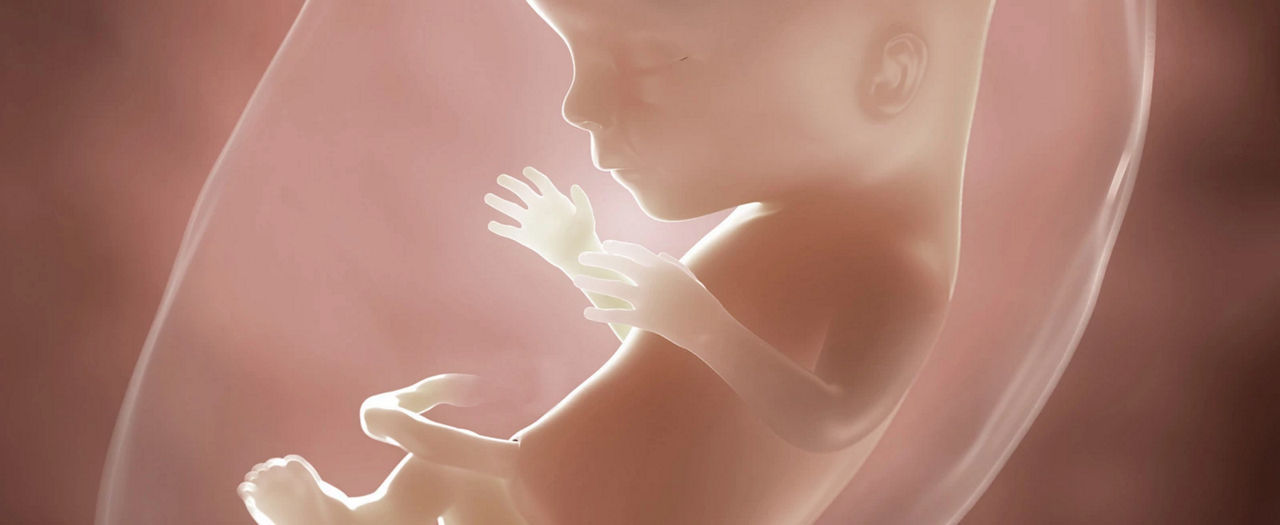Research has shown that listening to your voice in the womb relaxes your baby and lowers their heart rate, laying the foundations for both bonding and early language development. Amazingly, scientists have also discovered that unborn babies respond positively to word patterns, like nursery rhymes, that they can remember hearing before.
How to talk to your baby pre-birth
Finding the words
What to say and how to say it
Talking to your bump in the third trimester of pregnancy has been proved to have a calming effect on your baby, but incredible new research also shows that unborn babies can remember what they hear and can be soothed by repeated rhymes.
It’s just one of a series of insights into how talking to your bump can influence their early language development. Learn more about how your baby perceives the outside world with our Hello In There articles and videos.

Word patterns
Incredible new research shows that unborn babies can remember what they hear, laying the foundations for language development
Learning to hear
Hearing develops in a set sequence during pregnancy. The cochlea (responsible for translating soundwaves) are well formed by 15 weeks of pregnancy and fully functional by 20 weeks, but are not connected to the brain until around 24–30 weeks1. So although sound goes into the ears, the baby’s brain does not ‘hear’ it until the third trimester. Meanwhile the baby is already learning about life inside the womb through smell, touch and movement. By talking to your bump you can help your baby learn about the outside world too.
It’s your voice that they will love the most, and it will continue to comfort them long after they are born
The first thing your baby will probably hear is the inner workings of your body: your heartbeat, breathing and the gurgles of your food digesting2. But the most important sound to them will be your voice, which is thought to be the most intense sound they can hear in the womb3. After that, if the sounds are loud enough or close enough, they can also hear what is going on around you, reacting to music, sudden noises and getting to know the voices of other family members. But it’s your voice that they will love the most, and it will continue to comfort them long after they are born.

You can create your baby’s very first memories
Pre-birth memories
By measuring foetal heart rates, it’s been found that unborn babies react differently to being exposed to the same story or nursery rhyme over and over again for a few weeks, compared to when they hear a story for the first time.
Their heart rate goes down when they hear familiar word patterns, indicating that it relaxes them. Even more amazingly they can remember hearing the words even if there is a gap of a few weeks between readings, and even if someone else reads them4. They can also continue to recognise them for a short period as a newborn, so by reading a regular bedtime story or rhymes to your bump, you can create your baby’s very first memories.
Next steps
- During your third trimester why not choose a favourite nursery rhyme or short story and try reading it aloud once a day.
- Find a quiet spot by yourself, take a deep breath, and relax. It’s been proven that high levels of stress can affect your baby’s immunity 5,6, so spending some calm time connecting with your baby may be beneficial in more ways than one.
- If reading to your bump really isn't for you, don’t worry, your baby is learning about your voice every time you speak, so the bond will grow naturally.
- Look out for changes in your baby’s behaviour. Remember your baby will find your voice calming, so expect less movement rather than more.
- See if your baby reacts differently to a range of sounds – singing, for example, a rattle, or someone else’s voice.
- Dad and siblings can get involved too – they’ll have to get nice and close to the bump to make sure they’re heard.
- Learn more about what your baby hears in the womb and how you can encourage their early development through our Hello In There series.
related articles
Read more

Need some help?
You can get quick answers to common questions in our FAQs.
Alternatively, if you need help with general pregnancy or baby advice, or maybe on using or ordering our products - our expert team are always on hand to talk about feeding your baby.
- Graven SN, Browne JV. Auditory development in the foetus and infant. Newborn Infant Nurs Rev 2008;8(4):186-93.
- Abrams RM, Gerdhart KJ. The Fetus: The acoustic environment and physiological responses of the fetus. J Perinatol 2000;S20:30-5.
- Fifer WP, Moon CM. The role of mother’s voice in the organization of brain function in the newborn. Acta Paediatr Suppl 1994;397:86-93.
- DeCasper AJ et al. Fetal reactions to recurrent maternal speech. Infant Behav Dev 1994;17:159-64.
- Marques AH, Bjorke-Monsen AL, Teixeira AL, Silverman MN. Maternal stress, nutrition and physical activity: impact on immune function, CNS development and psychopathology. Brain Research. 2015;1617:28–46.
- Vianna P, Bauer ME, Dornfeld D, Chies JAB. Distress conditions during pregnancy may lead to pre-eclampsia by increasing cortisol levels and altering lymphocyte sensitivity to glucocorticosteroids. Medical Hypotheses. 2011;77:188–91.
Last reviewed: 19th June 2016





